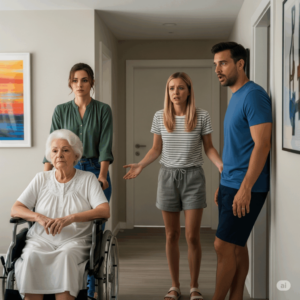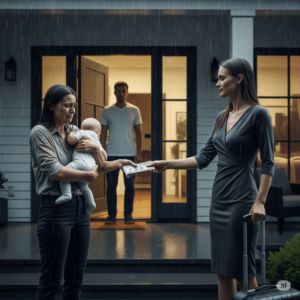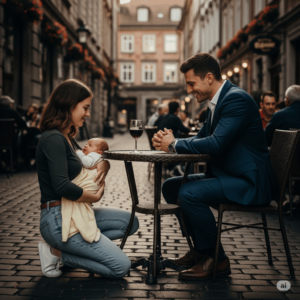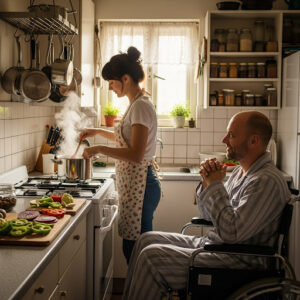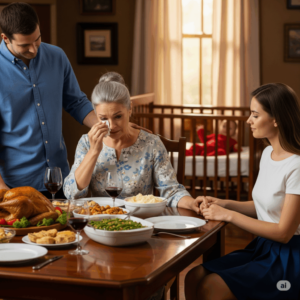After my husband’s funeral, my son took me to the edge of the city and said, “This is where you get off”… But he didn’t know the secret he already had inside…
😲
Below is a translation of the story into Spanish, along with the ending and subsequent journey of the characters:
After my husband’s funeral, my son said, “Get off,” but he had no idea what he had already done.
You probably wouldn’t survive such a sentence unless you’ve already lost so much that there’s hardly anything left to take away. So, before you get comfortable, take a moment to like the video and subscribe, but only if you really like what I do here. And while you’re at it, tell me where you’re listening to me from and what time it is.
Let’s see how many hearts are still beating tonight. Now, turn off the lights, maybe turn on the fan for a soft noise and let’s get started tonight. I laugh.
Of course, I laugh. I think he’s joking. I mean, who does that? Who takes her mother, who just buried her husband six days ago, to the edge of the city and tells her to get off? I’m wearing some old slippers.
My husband Leo’s slippers, in fact. I’ve been walking around the house with them since the funeral. They don’t fit me.
They never fit me. But I couldn’t wear real shoes. Not yet.
Are you serious?, I ask him. My voice is light, as if we were trying. As if we were still pretending.
That’s when he looks at me. And that’s when I know. It does not blink, it does not tremble.
He just hands me my bag as if he brought me takeaway. The house and the inn are mine now, he says. Camille is already changing the locks.
Camille, his wife, with her smile like stretched plastic and that soft, condescending tone that makes it all sound like a blessing and a warning at the same time. I blink loudly, as if maybe the path would change, as if maybe he would smile and say it was a mistake, a misunderstanding, a terrible joke. But it doesn’t.
My door is already open. My slippers touch the gravel. And before he can breathe, the car reverses.
This is crazy, I say. My voice doesn’t even tremble. She’s too quiet for that.
You can’t just… I’m your mother, Josh. He does not respond. It just says over his shoulder: you’ll understand.
You always do. And then he leaves. No suitcases.
No phone. No plan. Just a bag, a coat and the sound of tires on the wet road moving away from me like smoke.
I don’t cry. Not at that time. I just stay there.
Straight back. Stiff spine. The wind tastes of salt and rust.
The fog surrounds me, soft, but heavy, as if I am trying to memorize my shape. I watch its taillights disappear. And with them, 40 years of a life that I helped build.
But here’s what my son never understood. He didn’t leave me alone. He set me free.
He thought he was discarding me. What it really did was open a door that I didn’t know existed. Because he has no idea what I did before his father died.
We buried Leo only six days earlier. I hardly remember anything about the funeral except how the grass swallowed my heels and how Josh didn’t want to look at me. Camille clung to his arm like ivy, strangling a pole up close.
I remember him leaning over the pastor, whispering loud enough for me to hear. She’s not thinking clearly. It is mourning.
He is not making rational decisions. At the time, I thought I was trying to be gentle. I thought his intentions were good.
But now, standing there in the fog, I realize what that moment really was. It was the first move in a coup d’état. Leo had trusted Josh with the hospice documents.
I didn’t want to carry my son. That’s what I told myself. He had enough on his plate.
All he wanted was to give Leo dignity in his final weeks. But somewhere between medical forms and insurance calls, something else slipped in. Something with my name on it.
Something falsified. I didn’t know the full magnitude, not yet. But I knew enough to feel the disease bloom in my chest like fire under the ice.
This was not just treason. It was theft. Everything.
My husband. My house. My voice.
The inn that Leo and I built from scratch with paint-stained hands and second-hand furniture. The place that started with two rooms, a portable stove and a lot of hope. Josh had always been shrewd.
Too cunning. Even as a child, he found the gaps. But that cunning grew fanged when paired up with Camille.
That woman could turn politeness into a weapon. I started walking. I didn’t know where, I just knew that I couldn’t sit still.
Not in that fog. Not in those slippers. My knees hurt.
My mouth was dry. But I walked. I passed by the dripping trees.
I walked past the moss-covered fences. I walked past the ghosts of everything I let go so my son would grow tall. Around kilometer four, something settled over me.
Silent, but firm. They think they have won. They think I’m weak.
Disposable. But they forgot something. I still have Leo’s account book.
I still have the safe. And most importantly, I still have my name in that title. I’m not dead yet.
The fog stuck to me like sweat. My legs were burning. My breathing was shallow.
But I didn’t stop. Not because she wasn’t tired. He was.
God, I was. But if I stopped, I would think. And if I thought, I’d break.
I passed under a power line. A crow was watching me from above, as if it knew. As if he understood it.
I remembered the little notes I used to put in Josh’s lunchbox. You are brave. You’re kind.
I love you. I cut the turkey sandwiches into dinosaurs. I read him four books every night.
I even learned how to braid action figures in her hair because I wanted warrior styles. And now, it was trash on the side of the road. That child who used to run into my arms after a nightmare.
He’s gone. Replaced by a man who could throw me away like yesterday’s recycling. I don’t remember how many kilometers I walked.
Six, maybe more. But when I saw that faded sign for Dora’s General Store, my legs almost gave out. Dora had been running that little shop since I was a teenager.
He used to sell hard candy and newspapers. Now he was selling lavender lattes and dog treats in the shape of ducklings. I opened the door.
The bell gave a resounding “ding”. Dora looked through her glasses. Georgia, he said, his voice high-pitched with concern.
You look terrible. I feel terrible, I replied, my lips too cold to smile. She didn’t wait.
He just went behind the counter and wrapped me around before I could argue. What the hell happened? I looked down at my feet. Walked.
Whence? Of the intersection. She stopped me, eyes wide open. That’s eight damn kilometers.
Six and something, I murmured. She sat me down, wrapped me in a plush coat, and put a steaming cup of coffee in my hands, which smelled of salvation. Where’s Josh? My throat closed, empty.
He froze. What do you mean by “missing”? I couldn’t answer. Not yet.
He did not insist. He simply said: rest. I’ll make you a sandwich.
And I sat there, wrapped in old kindnesses with blistering feet and bleeding pride, and a single sentence buzzing in my head like a prayer. What is love without respect?
Dora offered to take me somewhere, anywhere. I told him no.
I wasn’t ready for that kind of kindness. Not yet. I called a taxi from Dora’s phone, paid with the emergency money that Leo had asked me to keep in my bag.
He always said that a woman should never be left without a backup plan. How curious how that advice was recorded when so many other things vanished. The driver asked no questions, just took me down the road to a small motel with a flashing sign and a cracked ice machine.
The kind of place truckers sleep when the road freezes. It wasn’t charming, not welcoming, but anonymous. I paid in cash, signed with a false surname and carried my bag attached to my chest as if it could make me warm.
When I walked in, the room smelled of lemon cleaner and wood paneling. The duvet was made of polyester. The light on the nightstand buzzed as if she were trying to remember how to shine.
I didn’t care. I stood in the middle of the room, dropped the bag on the floor, and whispered aloud for the first time since the funeral. You’re right, Leo.
And then, lower. As if he were saying it only to the specks of dust in the air. I knew this was coming.
The next morning, I sat on the edge of the motel bed, wrapped in one of those rough hotel towels, my fingers around a warm cup of lobby coffee. My bones hurt, but not just from the walk. She was tired in a way that sleep couldn’t fix.
And then a memory came to me uninvited, but not unwanted. Leo and I on our first spring at the inn. The earth still clinging to our fingernails, our hands sore from carrying stones.
We planted six rose bushes outside, two red, two peach, two yellow. Leo said people should smell something sweet when they get out of the car. First impressions matter.
That day, the sun illuminated the silver in her hair just right. I was laughing. Josh was small at the time, maybe seven years old, chasing a green ball across the grass, hiccuppering with how loudly he was laughing.
It had been a good day, a perfect day if I’m honest. And now, here I was sitting in a motel that seemed to have forgotten what decade it was built, remembering how we used to dream. The fog had not yet lifted outside, it was still heavy, still stuck to the windows like breath.
But there was already more light, a change in the gray, not exactly hope, but something. I found a takeout menu in the drawer, a Bible as well, and a pack of matches from a local auto store. I didn’t need them.
I just held them in my hand for a while, trying to remember the last time I felt so anonymous. I spent four decades of my life as the face of something, greeting guests, baking muffins at dawn, folding fresh towels with lavender sachets, writing welcome notes by hand, a life on the move. Now, stillness.
And the silence was not strong. He was patient, as if he had been waiting. Then that afternoon, I walked again, slower this time, more deliberate.
There was a park right on the road, half gravel, half dying grass. Two picnic tables, a swing that seemed to have given up. A young mom was trying to cram her toddler into a padded coat.
She looked exhausted, the kind of tiredness I remember. I used to sing Josh to sleep when nothing else worked, making up lullabies about dragons who just wanted quiet caves and soft blankets. He would curl up against me, fingers in my hair, trusting that he could fix whatever was broken.
Where did that child go? I went back to the motel, found my diary buried deep in my bag. A leather one that Leo gave me two Christmases ago, still smells of cedar and ink. I turned the pages until I found the last thing he wrote, a sticky note between the pages.
Don’t let them push you away. You still have your name in the title. Its handwriting, trembling but sure.
His last message to me before everything went dark. And so, suddenly, I felt like I was a flare in the dark. He knew it.
Even as he died, he saw what was coming. Maybe I saw it too. Maybe I just didn’t want to name it.
But now he had a name. Treason. And he had a face.
Josh’s. That night I didn’t cry. But I did lie down on that motel bed, staring at the water stain on the ceiling and whispering into the silence.
I miss you, Leo. And after a long pause, I think I’m finally ready to do what you told me. Because it wasn’t just a moment that warned me.
There were hundreds. Soft. Subtle.
Easy to overlook. The way Josh stopped calling me unless something needed fixing. The way Camille said, you must be tired as if it was a kind suggestion when it was actually a leash.
The way he stopped calling me mom. He started calling me Georgia. The name change hurt more than I ever admitted.
Not because it was cold, but because it was intentional. Action
As the sun slowly rose above the horizon, its warm light piercing through the cracks of the seedy hotel where I had taken refuge during those days, the feeling that something inside me was beginning to change was unmistakable. I had spent months wandering aimlessly, not knowing if I would ever find my place in the world again. But as I looked at that first light of day, I knew there was something in me that hadn’t been broken, something that was being rebuilt, stronger and wiser.
With the days spent at the motel, I took the time to look back and think about what I had lost and what I had gained. I didn’t know exactly which way to go, but I knew I wasn’t afraid to walk it alone anymore. Something inside me had changed that night when my son threw me on the edge of the world. He thought he was leaving me behind, but what he did was give me the freedom to find myself.
I remember when I returned home for the first time, after the forced flight. The house I shared with Leo, my life shared with him, everything seemed alien and distant. Everything, except the memory of our smiles and the love we had cultivated in that place. I saw through the car window, that place that had been my refuge and my life, now seemed empty. Not only because I was physically alone, but because I felt how my son’s betrayal had permeated the walls of that home.
There was nothing I could do to reverse what had happened, but there was something I could do to heal. I knew deep down that the love I had for my son wasn’t gone, even though his actions had broken me. I had lost something, yes, but I had found something too: my own power.
As the days went by, I moved away from what was hurting me. I called Dora, an old friend who had given me refuge in those moments of despair. She encouraged me to take the next step. I told him how I felt broken, how Josh’s betrayal had left me aimless, but also how that same feeling had allowed me to look forward and not back. It was Dora who suggested to me that, if I could no longer continue in the same place, I could create something new. A different life, something that belonged only to me.
So I decided to open something new, but in a different way, without pretensions, without the pressure of perfection. I plucked up the courage and decided to do what Leo had always wanted me to do: follow his dreams, the ones we shared on those sunny spring days. Thus was born “El Viento Segundo”, a place without pretensions, but with the soul of what we once built together.
Soon, people began to arrive. Not because of the luxury, not because of the fame, but because the name resonated with something profound. Words ran between them, those who needed a place to breathe, where they could feel understood. Every guest who arrived was not just a visitor, but someone in need of shelter. And I offered that refuge, without judgment, without haste, only with the tranquility of someone who has learned to heal. Every night I spent with a new face in my home reminded me that I had done the right thing.
The echo of what I had lost made me more aware of what I had gained. Leo and I had dreamed of something that was now real, something that, although very different, was what I needed to heal. And it was there, in that small, humble refuge, that my life began to have a new purpose.
During those first few months, Camille and Josh’s presence in my life slowly faded. Not because I had stopped loving them, but because I no longer allowed their shadow to rule my days. Unbeknownst to him, Josh had done me a favor. He had given me the freedom to create something that, at last, was mine.
The transformation was slow, but real. The days turned into weeks, the weeks into months, and in that time I learned to be the woman I always was, but had forgotten. I no longer cared if Camille had anything to say about my life, or if Josh ever came to give me the explanations I wanted. All I cared about was my peace, the peace I had found after the storm.
But one day, on a Wednesday afternoon, I received a letter, a letter I wasn’t expecting, with Josh’s name written on the envelope. My heart stopped for a second, but then I made the decision to open it.
“Mom, I realize what I did. I was wrong about everything. I didn’t realize what I had until I lost it. Camille blinded me. I thought it helped me, but I was actually walking away from you. I let you go, and I should never have. I regret everything, Mom. And I hope that one day you can forgive me.”
I read it three times before the tears began to fall. Not because I was sad, but because I finally understood that, although I had lost it, there was something that did not break between us: love.
I didn’t respond right away. I wasn’t ready. But I knew that, one day, that letter would be the beginning of a path toward reconciliation. And deep down, I understood it. I had found peace in my life, not because everyone agreed, but because I had decided that I would no longer depend on the acceptance of others to be happy.
The Second Wind continued to grow. I kept growing. And while the traces of what I had lost would never completely disappear, there was something bigger than those scars: the love I had rebuilt for myself.
The seasons passed, and with them, my pain turned into strength. Every guest who came to the place reminded me that life is not about what you lose, but about what you find in the process. And I had found something greater than revenge or repentance. I had found my second chance, my own.
END.
